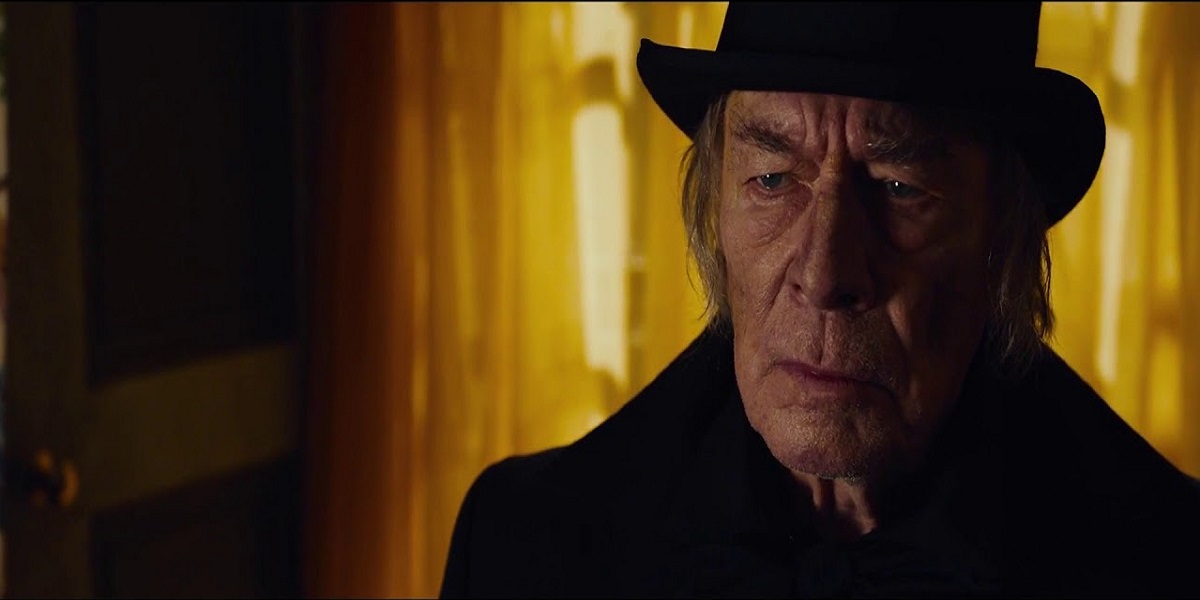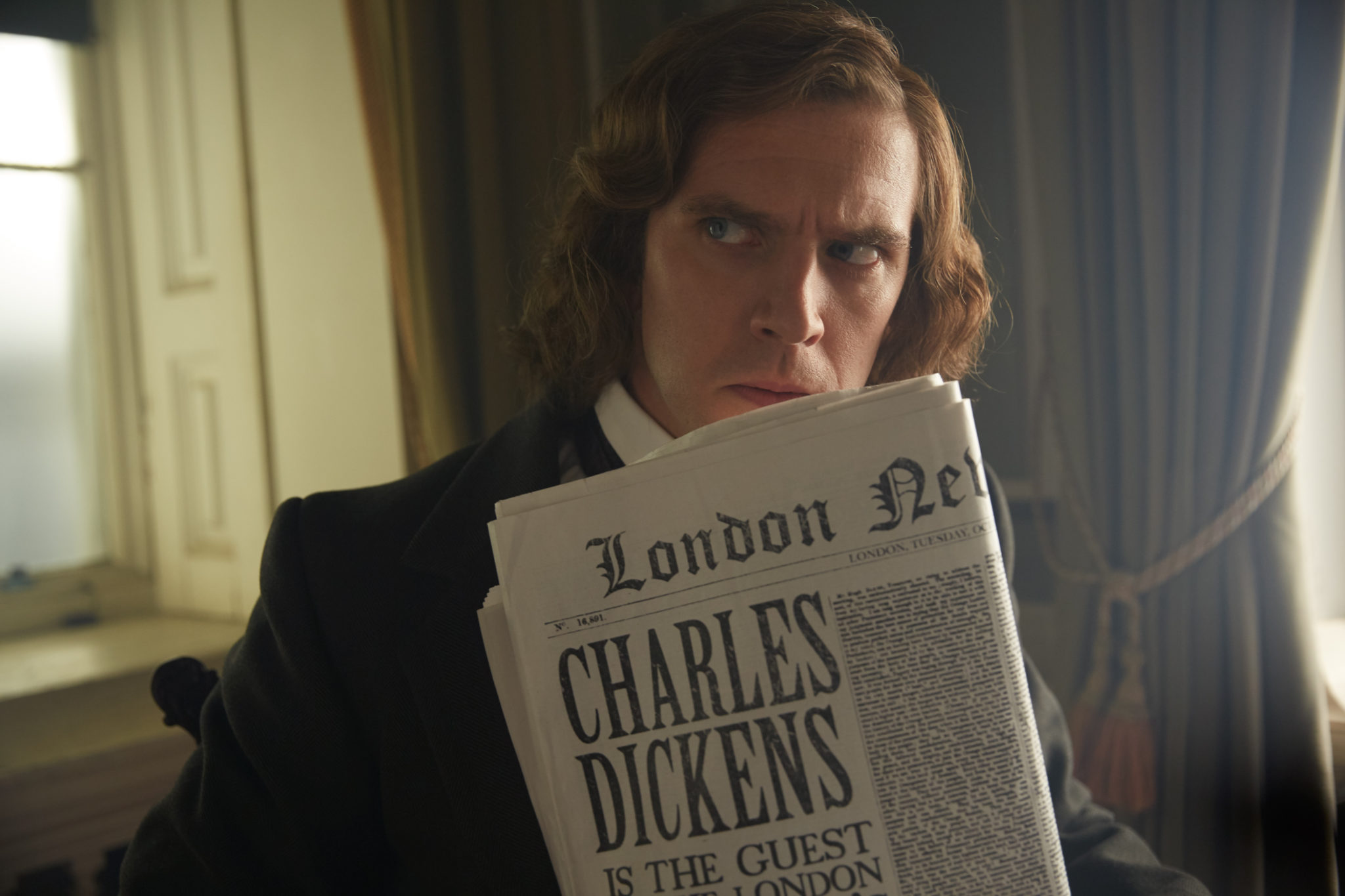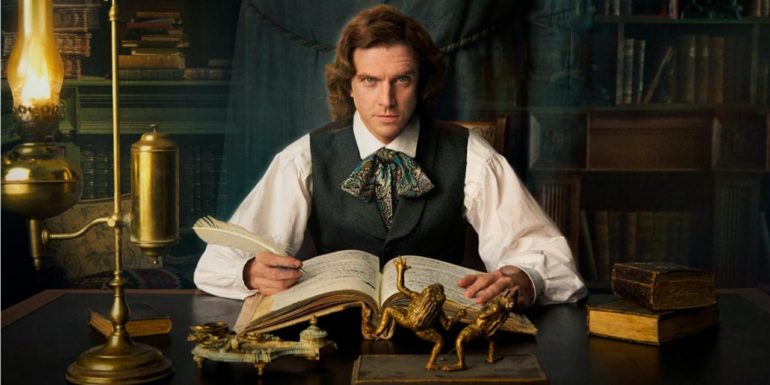Filmed in Ireland last year, The Man Who Invented Christmas is out in Irish cinemas from today. The festive and light-hearted feature about the most iconic Christmas story ever written and the genius behind it stars Dan Stevens (Downton Abbey, Beauty and the Beast).
Directed by Bharat Nalluri (Miss Pettigrew Lives for a Day, Spooks), the film sees Stevens play a young Charles Dickens alongside Jonathan Pryce (Game of Thrones) as his father and Christopher Plummer (The Sound of Music) as the stony-hearted Ebenezer Scrooge and has a strong Irish supporting cast including David McSavage, Ger Ryan and Anna Murphy.
In 1843, Dickens was a literary rock star, but struggling financially after the slow sales of his previous novel, Martin Chuzzlewit. Seized with the vision of a story that would fire the hearts of humanity, Dickens pitched his publishers A Christmas Carol, but they passed. Desperate, Dickens declared he would publish it himself. Slipping into the world of his novel, he spent the next six weeks laughing and arguing with his characters, acting out scenes like a madman on the streets of London for hours on end. His family and friends worried he was going insane, but Dickens prevailed and finished just before Christmas, creating a masterpiece which gave birth to the Christmas we know and love today.
Scannain caught up with director Bharat Nalluri ahead of the film’s release.

The Man Who Invented Christmas filmed in Ireland last year at Christmas time. “We were really lucky last year. It was bright. It was a bright Christmas in the run up. There’s a certain life imitating art. Dickens wrote A Christmas Carol in 6 weeks in the run up to Christmas 1843 and we filmed in 6 weeks around Christmas, 3 weeks before and after Christmas 2016.”
A lot of the film is set indoors meaning that there was no need to try block out the modern artificial Christmas lights dotted around Dublin. “It was purposefully done. I wanted to experience it like Dickens would have experienced it. Early on I went “Dickens has never seen a CGI movie” so how he would have imagined ghosts appearing or stages moving or sets moving would have been very theatrical. And there’s a thing in the film where we are talking about a magic lantern and how that’s part of his history with his father so we gave it a very magic lantern type feel. It was very old-word filmmaking, which for me was just a joy. We didn’t have to keep throwing up green screens everywhere, we just did it in the blocking and in the set moves. I think that it gives it a real defined feel. And people are noticing.”
The film itself pays close attention to Victorian details in production and costume, and has a real warm almost wooden feel. “Wooden in a good way right? Warm wood like mahogany. Rich. We wanted to make it very welcoming. We didn’t want it to be a Dickensian, dour piece. And part of that is the magic realism in it. It’s a film full of magic realism, as the book is. All these ghosts appear and they turn his word inside out, and we wanted to give a very surprising feel to it. And the we were surrounded by brilliant Irish designers like production designer Paki Smith and Leonie Prendergast on costumes. It was an extraordinary team of craftsmen that we found in Dublin. Now I’m desperate to take them on everything that I do. It was a really really joyous experience.”
Through recent films and television Irish has extensive experience recreating the Victorian era. “You’ve heaps and heaps. A lot of your crew go abroad and come back too. Paki has worked with Christopher Nolan and hugely experienced moviemakers. We were lucky enough that these lived in Dublin and that we could tap into them. That was part of the experience, finding these really fresh to me people. The lack of cynicism was lovely. Cynicism kills moviemaking. Whenever you get s cynic on a set it just kills it. These were really optimistic, can-do people. Which you can see in end film. You can see that joy of filmmaking.”
The Man Who Invented Christmas is fundamentally a family story… “That’s exactly what it is. It basically he mirrors Scrooge’s journey. He’s redeeming himself by becoming a better family person, and so that was the mirror. Honestly, when you’re in love with your crew and your cast it all helps and it all comes out when you’re making a film about that journey. It really does come out on the screen.”

Dan Stevens seems to have an infectious charm about him… “He leads from the top. He is ridiculously nice. He is just a good bloke. He doesn’t try. When you’ve a lead like that you’re always looking to them to set the tone. He’d turn up everyday…and other than being super professional with his work ethic…everyone is his best friend. He’s bringing gifts to everyone every other day. He’s bringing in a coffee-machine for everyone and he’s just ludicrous. When you get to work with someone like that it’s just fantastic.”
In addition to Stevens, the film features some of the best known stars of British stage and screen. “British and Irish! There’s a lot of Irish cast in this. It’s surprising. I’d say it’s the majority of the cast, three quarters are Irish. And Canadian with Christopher Plummer, but Dan is British, as is Jonathan Pryce. If you’ve got a good script then it’s easy to cast. Casting can be a fickle process and if the script is not quite good enough people are like “We’ll do it, but how is it going to be better?” When you have a great script you can pretty much get anyone you want, because everybody wants to do good stuff. I’ve discovered over the years that all anybody really wants to do is good stuff. That includes crew. We all want to be involved in good stuff and we all got into this industry to make good stuff. You get waylaid every now and then, but if you come across a good script and people can spot it straight away. It’s like a phonecall to Chris Plummer and you ask “do you want to play Scrooge?” And he’s like “what’s the script, can you send me the script?” And then he’s like “Of course I want to play Scrooge. This is a brilliant script.” And he’s never played it before. I know it’s my movie, but I think he’s nailed it. It’s like the iconic Scrooge. He’s cracked it. He brings something out, he brings humour to it. He’s hysterical. He can do the curmudgeon but he has this twinkle in his eye, and that’s the infectious bit of his Scrooge. That was fun.”
So how true is the tale to the actual life of Dickens in this period? “It’s pretty well documented. I mean we heightened a lot of it. But it’s pretty well documented from things that actually happened. He did go on his night journeys, he did see a lot of things. He did see the poverty, except in Manchester. He did see the kids where ‘Ignorance’ and ‘Want’ come from. He did include elements he saw around him and he did pickpocket names. He’d spot a name and he’d be like “I’m having that one” and he’d collect them. And he did talk in character. That’s well known from people who used to walk past his study. They could hear him talking in all the characters. He was almost an actor. And so what Susan Coyne did with the script was that she took that next step and she had the characters come to life. Which is a much better way of visualising it as opposed to seeing a writer with a quill pen. That’s not very cinematic. The artistic process isn’t a very visual process. It’s usually quite internal. Having his characters come to life and then criticise him is almost like having him in therapy with his own creations. When Scrooge turns around and says “Shakespeare, now there’s a man who could write!” that’s a great moment.”
A Christmas Carol was written in a fallow period for Dickens. He was coming off a run of three under-performing books and was facing mounting debts from an extravagant lifestyle. “We describe him as a literary rock-star. He’s 31. He’s not the Dickens that people think of. The curmudgeon, 50-year-old with the strange beard. He’s actually a young handsome man-about-town. We actually based his look on a portrait of him in Boston in 1842. And he looks amazing like Dan Stevens. He has a very similar vibe. He’s very energetic. He’s written Oliver Twist. He’s written Nicholas Nickleby. At 31! If I’d written Oliver Twist that young I’d have retired! He feels that he hasn’t proven himself. All of his books have been plagiarised and bootlegged. There’s no international copyright. He’s not made any money. He likes the finer things in life. He’s a ‘champagne socialist’. That’s part of his backstory. That’s the bit of his father. His father is very profligate and giving. He wanted the finer things in life but didn’t think of the consequences. And that’s his fear, that he’s turn into that. Because that led to his father going to debtors prison and him having to bail out the family. Which was his brush with poverty. He’s a rock-star, but he’s written three books Barnaby Rudge, Martin Chuzzlewit, and American Notes. And they’re the three books of his that I haven’t read as they’re kind of tedious. You read about two chapters and you’re like “Really?” and they’re all flops. He felt that they were important so he doesn’t understand. This is the rock-star with his difficult fourth album and he can’t quite get it out. And it’s actually stopping him from moving on and changing the world, which is what he did. So in this six weeks, this time-slice of his life, he not only wrote a book that’s still in print now, but has been published in every language in the world. It’s cross-cultural, people completely get it and they still find it incredibly relevant and important. It literally changed the laws of the land, I think, because it got people thinking about charity and philanthropy. And it undid his writer’s block. His next book was David Copperfield and he just went on to Great Expectations and on. Without this book we may not have had the Charles Dickens that we all know now.“
The Christmas movie is a big deal… “I didn’t realise that I was making a Christmas movie. I really didn’t realise. It’s only now, and especially in America. The Christmas movie is huge in America. People were like “You made a Christmas movie. This is going to be on forever.” and I was like “Have I made a Christmas movie? I have made a Christmas movie!” If I’d realised that I was making a Christmas movie I would never have begun. Having said that I referenced one of my favourite Christmas movies, Capra’s It’s a Wonderful Life. There’s a few references to that in this film for filmmakers to discover. It’s essentially A Christmas Carol in reverse, a good man being shown how much worse the world would be without him. But all good Christmas movies are. They are about that redemptive quality. I cite Groundhog Day as one of my favourite Christmas movies. It’s not a Christmas movie as it’s on Groundhog Day in February, but the mechanics of it, a man revisiting himself until he becomes a better human being, the mechanics of it are exactly the same. The other one I always reference is Die Hard. One of my favourite Christmas movies. And Planes, Trains and Automobiles, a Thanksgiving movie, but a Christmas one too. And in all of those movies…snow falls at the end. Even in Die Hard with paper falling from the office. It’s not going to snow in L.A., but they make it snow. Just like we did at the end of our movie. It’s got to snow.”

